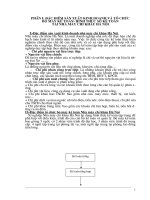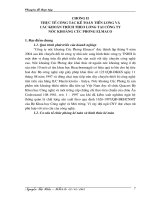FCF to Equity(FCFE) Models
Bạn đang xem bản rút gọn của tài liệu. Xem và tải ngay bản đầy đủ của tài liệu tại đây (6.34 MB, 59 trang )
FCF to Equity(FCFE) Models
Valuation: 중앙대학교 경영학부 박창헌 교수
Free Cash Flow Valuation
The value of a firm's stock is calculated by forecasting free cash
flow to equity (FCFE) or free cash flow to the firm (FCFF) and
discounting these cash flows back to the present at the
appropriate required rate of return.
FCFE or FCFF are the appropriate modes to use when:
(1) the firm does not pay dividends at all or pays out fewer
dividends than dictated by its cash flow,
(2) free cash flow tracks profitability, or
(3) the analyst takes a corporate control perspective.
1
FCFF and FCFE
2
Free Cash Flow to the Firm (FCFF)
3
Free Cash Flow to Equity (FCFE)
4
FCFF Approach to Valuation
5
FCFE Approach to Valuation
6
Common Mistakes in FCFE and FCFF Valuation
7
Ownership Perspective in FCF and DDM Models
8
Free Cash Flow vs. Dividend in Valuation
Analysts often prefer to use free cash flow rather than dividendbased valuation for the following reasons:
9
Dividends vs. FCFE – Global Comparison
In 2010, the global median of dividends as a percent of FCFE
was about 60%, with most companies paying out less in
dividends than they had available in FCFE.
Source: Aswath Damodaran (p. 355)
10
How Financing Decisions Affect Future FCFE
Dividends, share repurchases, and share issues have no effect
on FCFE (and FCFF);
Changes in leverage have only a minor effect on FCFE and
no effect on FCFF.
11
Calculating FCFF from Net Income
(e.g., depreciation expenses)
(a.k.a., capex)
(changes in noncash working capital)
12
Calculating FCFF from EBIT
13
Calculating FCFF from CFO
14
Calculating FCFE from FCFF
15
Calculating FCFE from NI or CFO
16
Free Cash Flow with Preferred Stock
17
FCFE when there are Preferred Dividends paid
+
Source: Aswath Damodaran (p. 353)
18
Forecasting FCFE and FCFF (1)
Source: Aswath Damodaran
19
Forecasting FCFE and FCFF (2)
Source: Aswath Damodaran
20
Forecasting FCFE and FCFF (2)
Source: Aswath Damodaran
21
Net Income a Proxy for FCFE?
22
Estimating Growth in FCFE
Continued on next slide
23
Estimating Growth in FCFE
24









